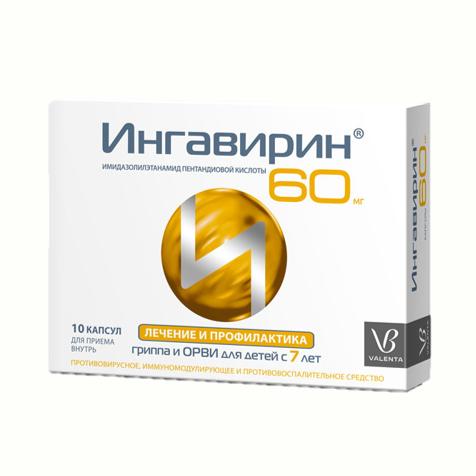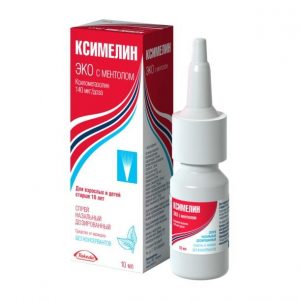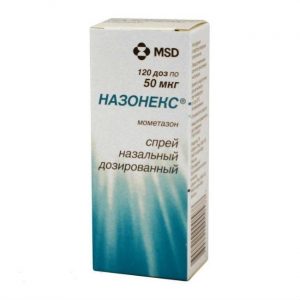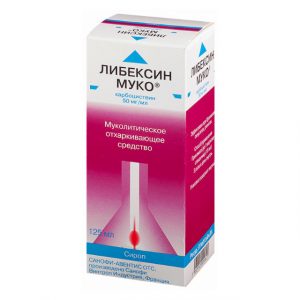Description
Description
Yellow capsules. The capsule lid is marked with a white logo in the form of a ring and the letter AND inside the ring.
The contents of the capsules – granules and powder of white or almost white color, the formation of conglomerates is allowed, easily crumbling with light pressure.
Release form
Capsules 60 mg.
7 or 10 capsules per blister or per blister with perforation from a film of polyvinyl chloride and varnished aluminum foil.
One pack of packaging along with instructions for use is placed in a pack.
Pharmacological action
Pharmacotherapeutic group: Antiviral agent. Anti-inflammatory agent.
ATX Code: [J05AX].
Pharmacological properties of
Pharmacodynamics
Antiviral drug.
Preclinical and clinical studies have shown the effectiveness of the drug Ingavirin ® against influenza viruses of type A (A (H1N1), including pig A (H1N1) pdm09, A (H3N2), A (H5N1)) and type B , adenovirus, parainfluenza virus, respiratory syncytial virus in preclinical studies: coronavirus, meta-pneumovirus, enteroviruses, including Coxsackie virus and rhinovirus.
Ingavirin ® helps accelerate the elimination of viruses, reduce the duration of the disease, and reduce the risk of complications.
The mechanism of action is realized at the level of infected cells due to the stimulation of innate immunity factors suppressed by viral proteins. In experimental studies, in particular, it was shown that the drug Ingavirin ® increases the expression of the first type of IFNAR interferon receptor on the surface of epithelial and immunocompetent cells.
An increase in the density of interferon receptors leads to an increase in the sensitivity of cells to signals of endogenous interferon. The process is accompanied by activation (phosphorylation) of the STAT1 transmitter protein, transmitting a signal to the cell nucleus for the induction of antiviral genes. It has been shown that under conditions of infection, the drug stimulates the production of the antiviral effector protein MxA, which inhibits the intracellular transport of ribonucleoproteins of various viruses, slowing down the process of viral replication.
The drug Ingavirin ® causes an increase in the content of interferon in the blood to a physiological norm, stimulates and normalizes the reduced -interferon-producing ability of blood leukocytes, stimulates the -interferon-producing ability of leukocytes. It causes the generation of cytotoxic lymphocytes and increases the content of NK-T cells with high killer activity against virus-infected cells.
The anti-inflammatory effect is due to the suppression of the production of key pro-inflammatory cytokines (tumor necrosis factor (TNF-β), interleukins (IL-1 and IL-6)), a decrease in the activity of myeloperoxidase.
Experimental studies have shown that the combined use of the drug Ingavirin ® with antibiotics increases the effectiveness of therapy on a model of bacterial sepsis, including that caused by penicillin-resistant strains of staphylococcus.
Conducted experimental toxicological studies indicate a low level of toxicity and a high safety profile of the drug.
According to the parameters of acute toxicity, Ingavirin ® belongs to the 4th toxicity class – Low toxic substances (in determining the LD50 in acute toxicity experiments, lethal doses of the drug could not be determined).
The drug does not have mutagenic, immunotoxic, allergenic and carcinogenic properties, does not have a locally irritating effect. The drug Ingavirin ® does not affect reproductive function, does not have embryotoxic and teratogenic effects.
Efficacy in children
In a double-blind, randomized, placebo-controlled, multicenter study evaluating the clinical efficacy and safety of Ingavirin ® in a daily dose of 60 mg for the treatment of influenza and other acute respiratory viral infections in 180 children aged 13-17 years, it was shown that Ingavirin ® significantly superior to placebo, faster normalizing body temperature, stopping intoxication, fever, catarrhal phenomena.
A double-blind, randomized, placebo-controlled, multicenter study evaluating the clinical efficacy and safety of a daily dose of 60 mg Ingavirin ® for the treatment of influenza and other acute respiratory viral infections in 310 children aged 7-12 years showed that the drug Ingavirin ® has significantly greater efficacy compared with placebo and provides a faster (18 hour average) decrease in body temperature and the disappearance of intoxication symptoms (sore throat, perspiration, pain when swallowing, nasal congestion, runny nose).
Pharmacokinetics
Absorption and distribution.
In recommended doses, the determination of the drug in blood plasma by available methods is not possible.
In an experiment using a radioactive label, it was found: the drug quickly enters the bloodstream from the gastrointestinal tract. Evenly distributed throughout the internal organs.
Maximum concentrations in the blood, plasma and most organs are reached 30 minutes after administration of the drug. The values of AUC (area under the pharmacokinetic curve “concentration time”) of the kidneys, liver and lungs slightly exceed blood AUC (43.77 mcg.h / g). AUC values for the spleen, adrenal glands, lymph nodes and thymus below the blood AUC. MRT (average drug retention time) in the blood 37.2 hours.
When taking the drug once a day, it accumulates in the internal organs and tissues. At the same time, the qualitative characteristics of the pharmacokinetic curves after each administration of the drug were identical: a rapid increase in the concentration of the drug after each administration 0.5-1 hours after administration and then a slow decrease by 24 hours.
Metabolism.
The drug is not metabolized in the body and excreted unchanged.
Withdrawal.
The main process of excretion occurs within 24 hours. During this period, 80% of the dose taken is displayed: 34, 8% is excreted in the time interval from 0 to 5 hours and 45.2% in the time interval from 5 to 24 hours. Of these, 77% is excreted through the intestines and 23% through the kidneys.
Indications
Treatment of influenza A and B and other acute respiratory viral infections (adenovirus infection, parainfluenza, respiratory syncytial infection) in children from 7 to 17 years.
Prevention of influenza A and B and other acute respiratory viral infections in children 7 to 17 years old.
Contraindications
Hypersensitivity to the active substance or any other component of the drug.
Lactase deficiency, lactose intolerance, glucose-galactose malabsorption.
Pregnancy.
Breastfeeding period.
Children under 7 years old.
This dosage form is not intended for use in persons 18 years of age or older (it is necessary to use dosage forms that make it possible to take Ingavirin ® in a dose of 90 mg).
Special instructions
Concomitant use of other antiviral drugs is not recommended.
Influence on the ability to drive vehicles, mechanisms
It has not been studied, however, given the mechanism of action and the profile of adverse reactions, it can be assumed that the drug does not affect the ability to drive vehicles, mechanisms.
Dosage and Administration
Inside. Regardless of the meal.
For the treatment of influenza and acute respiratory viral infections, children from 7 to 17 years old are prescribed 1 capsule (60 mg) once a day. The duration of treatment is 5-7 days (depending on the severity of the condition). Taking the drug begins with the onset of the first symptoms of the disease, preferably no later than 2 days from the onset of the disease.
For the prevention of influenza and acute respiratory viral infections after contact with sick people, children from 7 to 17 years old are prescribed 1 capsule (60 mg) once a day for 7 days.
Side effects
Allergic reactions (rare).
Drug Interactions
Drug interactions with Ingavirin ® have not been described.
Overdose
Cases of overdose of the drug Ingavirin ® to date not reported.
Storage conditions
In a dry, dark place and out of the reach of children at a temperature not exceeding 25 ° C.
Term hodnosty
3 years
active substance
Imidazoliletanamid pentandiovoy acid
Terms leave through pharmacies
without prescription
lekarstvennaja form
kapsul




